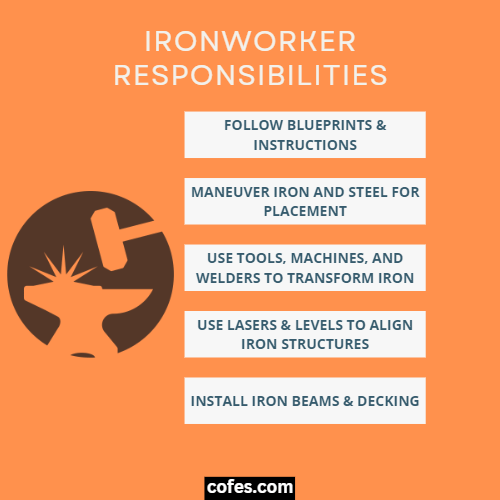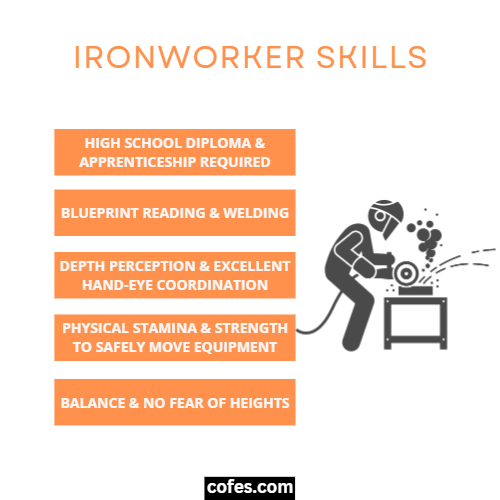A Complete Career Resource Guide For An Ironworker
Technology is dominating the world, but some jobs still require physical exertion.
For example, ironworkers still exist, and it is a highly lucrative industry.
Currently, there are more than 70,000 ironworkers in the United States.
The number will keep on increasing as the market keeps on growing.
If you want to pursue ironwork, you are in the right place.
Here is a complete career resource guide for you.
Ironworker Job Information
| Official Job Title | Ironworker/Welder |
| Average Salary | $47,526 |
| Stress Level | Average |
| Work/Life | High |
| Job Satisfaction | Low |
| Career Advancement | Average |
Ironworker Job Description
Here is a comprehensive job description of an ironworker to help you understand their responsibilities and duties:
What Is An Ironworker?
The primary role of an ironworker is to install steel frames and iron for various structures.
These include bridges, buildings, and much more.
Ironworkers mainly work for contractors, building companies, or construction companies during daytime hours.
However, ironworking requires physical exertion and is a dangerous job.
That is because all construction sites have hazards.
Therefore, it is crucial to understand this factor before pursuing ironworking.
What Does An Ironworker Do On A Daily Basis?
The ironworker will show up on the construction site daily.
Once they arrive, the contractor will assign them jobs they must do.
These can include anything from welding to installation and much more.
Ironworkers will collaborate with other construction members, and everyone will work as a team.
The daily duties will vary depending on the structure and the work environment.

Responsibilities, Duties, & Roles Of An Ironworker
There are some core responsibilities and duties of each ironworker.
These include:
- Cutting and welding metal
- Building and installing structural frames
- Operating the crane ball
- Reinforcing concrete
- Repairing or replacing structural components
- Maintaining tools and equipment
- Following safety regulations
- And much more
Ironworker Salary
Here is an ironworker’s salary, depending on where they are in their career:
Average Salary
The average salary of an ironworker comes to over $47,526 per annum.
Of course, that depends on the state, as everyone offers a different rate.
Starting Salary
The entry-level salary of ironworkers is around $36,610 per year.
As you progress, you will begin earning more.
Some construction companies might also offer more.
Senior Salary
The top 10% of ironworkers make up to $98,000 per year.
You can expect this salary as you obtain more experience with this work.
How To Become An Ironworker
If you want to pursue ironworking, you have come to the right place.
Here is what you must know:
The Entry Level: Certification, Training, & Degree
Fortunately, you don’t need a college education to become an ironworker.
The most common degree ironworkers have a high school diploma.
However, you should complete some certifications before becoming an ironworker.
You can earn professional certifications, including the OSHA Safety Certificate, Certified Welding Engineer, Certified Welder, etc.
It will help you improve your skills and ensure you have safety knowledge.
That is because safety is one of the most critical things on-site.
Other Skill Sets, Requirements & Qualifications
An appropriate skill set can elevate your work.
For example, ironworkers must have hand-eye coordination, depth perception, and balance.
Besides that, ironworkers must know how to interpret blueprints, operate tools, lift heavy weights, and much more.
In simple words, physical fitness is the most important thing when it comes to ironwork.
That is why you must have the strength and endurance to work in such an environment.
How Long Does It Take To Become An Ironworker?
It doesn’t take long to become an ironworker.
You don’t need a college degree.
You can obtain certifications after high school and become an ironworker quickly.
Is It Hard To Become An Ironworker?
It is not difficult to become an ironworker.
However, the job may not be for you if you don’t like exerting physical activities.
If you want such activities, you will not find ironworking too challenging.
Ironworker Career Paths
Are you contemplating if becoming an ironworker is your right career path?
If you are, here is what you must know about pursuing this career path:
The Ironworker Roadmap
The roadmap of an ironworker is simple.
You only need to earn a high school diploma to begin working.
Many people also get an associate degree, which is not required.
You can begin working in construction after high school to enhance your resume.
During this time, getting some professional certifications is also an excellent idea.
In addition, it will help you understand safety protocols on the job.
After that, you can look for a full-time ironworker job.
Many construction and building companies are always looking for new crew members.
Because of this, it will not be too challenging to find a job.

Projections For Growth In Ironworker Jobs
The projection for growth in the ironworker industry is 4% through 2031.
In Summary: Is Ironworker A Good Career?
If you like physical work, ironworking is the perfect career.
It pays well, and the work-life balance is good.
However, job satisfaction is not that high.
The reason might be the working conditions and the safety hazards.
That is why it is essential to have a complete picture before you opt for this career.
Working Conditions
Here is an overview of the working conditions of ironworkers:
Can A Ironworker Work Remotely From Home?
Ironworkers can’t work from home.
The workers must be on the field to do their work.
There is no such thing as remote ironworkers as the job is impossible to do from home.
How Many Hours Does An Ironworker Work?
An ironworker will work forty hours a week during the daytime on weekdays.
They don’t work at night, so their workday does not extend.
However, employment and working hours may vary depending on weather conditions.
Can An Ironworker Work Part-Time?
Yes, an ironworker can work part-time shifts.
Most companies pay ironworkers by the hour.
That is why they can take part-time shifts if they have other commitments.
What Are The Average Vacation Days Of An Ironworker?
The average vacation days of an ironworker depend on the company.
However, an ironworker can expect two to three weeks off per year.
The vacation time allows them to relax after stressful working conditions.
Alternative Careers & Similar Jobs to an Ironworker
- Construction Worker
- Surveyor
- Cost Estimator
- Construction Manager
- Safety Engineer
- Supervisor
- Heavy Equipment Operator
- Electrical Engineer
- Drafter
- Maintenance Engineer
- Engineering Technician
Ironworker Resume Tips
If you want to create one of the best ironworking resumes, you have come to the right place.
Here are the top tips you must apply:
- Select the correct format for ironworking. Chronological order is a great format
- Showcase all your experience and abilities on-site
- Get specific about your achievements in previous jobs
- Mention any special certification or training you have done
- Include an engaging summary
Ironworker Interview Questions
Here are some crucial questions you can ask ironworkers as an employer:
Q1: What was your greatest accomplishment as an ironworker?
Why it works: Asking this question will help you understand the strengths of the ironworker.
The strengths lead them to accomplish something.
That is why it is important to ask if you want insight.
Q2: What is the highest structure you were working on?
Why it works: Many ironworkers fear high structures.
If you are building an incredibly high structure, it is crucial to ask this question.
It will offer you insight if the worker is capable or not to work on your structure.
After all, you don’t want health or safety hazards on your construction site.
Asking this question will help you curb potential liabilities on your site.
Q3: Describe a challenging project you were working on and how you overcame it.
Why it works: Difficult projects can be highly stressful for many ironworkers.
Unfortunately, not everyone survives in such a high-stress environment.
That is why asking this question is essential.
If your project is complex, you must know if the ironworker can handle it.
The answer will help you understand if the candidate has what it takes to be a successful ironworker on your project.
Jobs Related To Ironworker
Some other jobs related to ironworking include:
- Foreman
- Superintendent
- Construction Manager
- Field Supervisor
- General contractor
For HR Managers: Tips For Hiring An Ironworker
As an HR manager, here are the top tips for hiring an ironworker:
Key Characteristics To Look For In An Ironworker
Here are some critical skills to look for in an ironworker:
- Physical strength and fitness
- Ability to collaborate
- Technical and mathematical skills
- Attention to detail
- Analytical thinking
Minimum Level Of Education & Experience
The minimum level of education you must have is a high school diploma.
However, you should obtain certifications if you want better pay.
Moreover, it will allow you to stand out as the demand for ironworkers is always high.
Reference Links
- https://www.mockquestions.com/position/Ironworker/
- https://www.livecareer.com/resume/examples/construction#agent_summary
- https://www.ironworkers720.com/skills-and-abilities
- https://www.careerexplorer.com/careers/ironworker/satisfaction/
- https://www.careerexplorer.com/careers/ironworker/job-market/
- https://www.zippia.com/ironworker-welder-jobs/
- https://www.ziprecruiter.com/blog/ironworker-job-description-sample-template/
- https://www.jobhero.com/job-description/examples/metal-work/iron-worker
